![]() Artificial Wetlands for Wastewater
Artificial Wetlands for Wastewater
Purification and Green Infrastructure
Development
It is a method inspired by the natural purification processes of tidal flats, utilizing water level fluctuations in the filtration bed, along with the functions of plants, soil animals, and microorganisms, to sustainably achieve high water purification efficiency.
In developing countries, rapid economic growth and population increases have made wastewater issues more pronounced. In emerging nations, industries such as tourism have further intensified the demand for effective wastewater treatment solutions. However, traditional purification methods, such as the activated sludge process, are often impractical due to their high installation costs, as well as the ongoing expenses for electricity, chemicals, and maintenance.
The proposed technology, tidal flow artificial wetlands, is easy to maintain, low-cost, and eco-friendly. It offers a sustainable approach to water purification that can be locally managed, making it well-suited to address the unique challenges faced by developing and emerging countries.
It is a method inspired by the natural purification processes of tidal flats, utilizing water level fluctuations in the filtration bed, along with the functions of plants, soil animals, and microorganisms, to sustainably achieve high water purification efficiency.
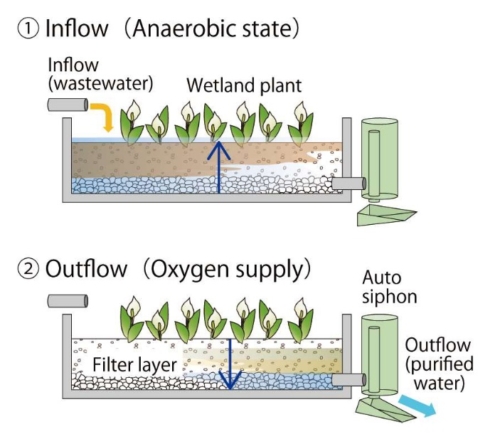
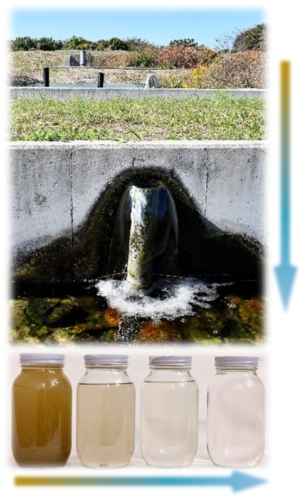
Major Features and Advantages
- Low Maintenance Costs
- No electricity costs for aeration
- No need for chemicals, specialized equipment, or filters
- Minimal Management Effort
- No chemical dosing, filter replacement, or professional inspections required
- No need for sludge removal
- Clean and Energy-Efficient
- Zero greenhouse gas emissions
- No use of electricity or chemicals
- High Resilience to Natural Disasters
- Continues wastewater purification even during power outage
- Treated water can be reused for recycling purposes
- Benefits for the Community
- Improves urban landscapes
- Generates profit through flower and vegetable cultivation
- Promotes environmental education and raises awareness about wastewater management
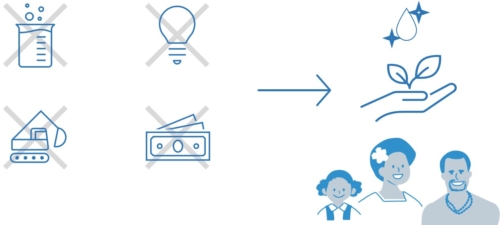
Technology Data
One of the common challenges faced by developing countries is securing funding for development. Therefore, it is essential to find effective ways to raise external funds. The ” Water Purification System by Tidal Flow Artificial Wetland ” that we propose addresses the following social needs and plays a crucial role in attracting financial support from developed countries and international organizations, in promoting sustainable development.:
- Transition to green infrastructure in civil engineering
- Integration of ecosystem services into architectural and urban designs
- Growing interest in environmentally conscious hotels and the tourism industry
- Promotion of eco-town and green building projects in emerging countries
- Investment in climate resilient development
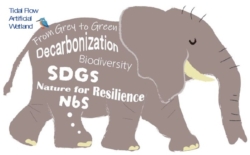
Technical maturity / Past record of introduction
In Japan, we have introduced our solutions to both public institutions and private businesses to address a wide range of wastewater treatment challenges, including sewage, gray water, and organic industrial wastewater from restaurants. Our solutions have successfully met the diverse needs of customers for water purification in different contexts.
Specifically, we have achieved the following:
- Significantly reduced life cycle costs by replacing existing treatment systems that require high costs for aeration and chemical use.
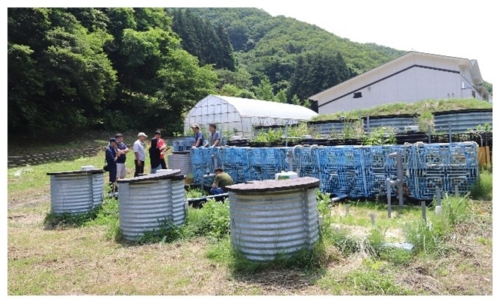
- Addressed unique needs in areas such as national parks, where natural purification methods are preferred due to environmental and social considerations, and where the use of chemicals and advanced treatment systems is limited or impractical.
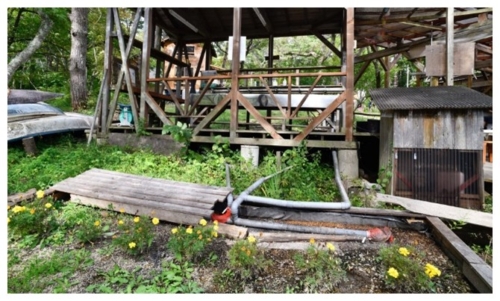
-
In addition to wastewater purification, our system has also been used to recycle treated water for purposes such as growing vegetables, flushing toilets, and supporting environmental education in local communities.
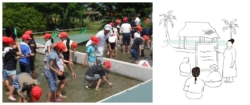
Information on patent related to this technology
In Japan, Nihon University, the co-developer, has obtained the following patents.
- Patent No. 2020-028815 “Water Purification System and Water Purification Method”
- Patent No. 2015-149783 “Artificial Wetlands for Water Quality Improvement
Company Data
| Name | Wesco Inc./College of Engineering, Nihon University |
| Address |
Wesco: 2-5-35 Shimadahonmachi, Kita-ku, Okayama City, Japan |
| Capital | Wesco: 100 million JPY |
| Contact person |
Wesco: Mr. Masanobu HOMMA |
| Number of employees | Wesco: 675 College of Engineering, Nihon University: 135 Faculties (4,061 Students) |
| Date of foundation | Wesco: September 21, 1970 College of Engineering, Nihon University: April, 1929 |
| The type of business |
Wesco: Civil and Construction Consulting and Engineering Services |
Modality of business transaction
We will provide the design and consultation directly to the client, while the local construction company will contract with the client to do the construction. Based on the contract, we can pay a success fee to a local agent.
Attachments
Schematic illustration of the technology
The brief explanation of the technology can be downloaded from below:
https://www.wesco.co.jp/info/wp-content/uploads/2024/11/Tidal-Artificial-Wetland.pdf (2.89MB)
Contact Person(s)
*Please mention that you saw UNIDO's website when making the first contact with the company.
Registered Category
- Environmental Technologies : Pollution Prevention and Control
- Human Health Technologies : Public health

